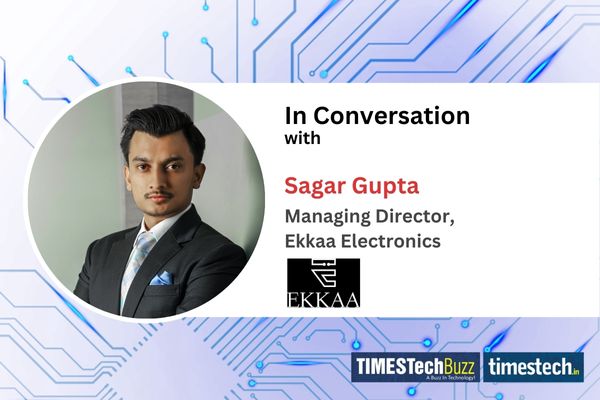In an interview with TimesTech, Sagar Gupta, Managing Director of Ekkaa Electronics, shares insights on the company’s rapid rise as India’s leading LED TV ODM. He discusses key milestones, challenges like supply chain disruptions, and how his finance background shaped Ekkaa’s growth. Sagar also highlights India’s ESDM potential, smart tech trends, and sustainability initiatives driving Ekkaa’s expansion into washing machines, speakers, and smartwatches.
Read the full interview here:
TimesTech: Ekkaa Electronics has grown remarkably since its inception in 2018. As a young entrepreneur who’s led the company to become India’s No.1 ODM for LED TVs in just a few years, what were some key milestones and challenges in this journey, and how did your academic background in finance and economics support this growth?
Sagar: My entrepreneurial journey has been quite a transformative experience—shaped by a strong academic foundation, early professional exposure, and a deep-rooted passion for building something impactful.
I was born and raised in Delhi, and from a young age, academics played a central role in my life. I was fortunate to receive a Letter of Excellence from the HRD Ministry in 2014, which further motivated me to keep pushing forward. I pursued my graduation from Shri Ram College of Commerce (SRCC), Delhi University, where I earned a B.Com (Hons). Alongside, I cleared the CA Foundation and Intermediate exams with exemptions and completed several NCFM certifications. I also appeared for the CFA (USA) exams to sharpen my understanding of finance and economics.
These academic experiences weren’t just qualifications—they helped me think critically, understand complex financial systems, and make decisions with long-term impact. During my articleship, I worked closely with over 150 companies, offering management consultancy and handling tax compliances. That exposure gave me a ground-level view of how businesses operate and the kind of discipline needed to scale them.
Entrepreneurship, however, was always in my DNA. My father, Mr. C.P. Gupta, had laid the foundation with his semiconductor and electronic components distribution business nearly three decades ago. In 2018, I took a leap of faith and started Ekkaa Electronics, driven by a vision to create a modern, innovation-driven manufacturing company. I was just 22 at the time, but determined to build something that could stand the test of time.
Starting from scratch, we quickly built momentum. Within just three years, Ekkaa became India’s No.1 Original Design Manufacturer (ODM) for LED TVs. Today, we handle a business of INR 600 crore, with manufacturing units in Sonipat, Noida, Nashik, and even an associate office in Shenzhen.
Having said that, the journey wasn’t without challenges. We had to navigate global disruptions like the COVID-19 pandemic, the Russia-Ukraine war, and semiconductor shortages during a time of global recession. These events caused serious supply chain disruptions, but we remained focused and resilient. We worked hard to ensure consistent supply, met delivery timelines, and built deep trust with our partners—earning our place as a dependable and innovative industry leader.
Looking back, I truly believe that my background in finance and economics gave me an edge. It helped me stay grounded in data, plan for contingencies, and lead with clarity even in turbulent times. Every challenge became a learning opportunity, and every milestone, a reminder of how far we’ve come.
TimesTech: The ESDM sector is a crucial pillar of the ‘Atmanirbhar Bharat’ and ‘Viksit Bharat’ missions. How do you see India’s ESDM evolution shaping up, and what role is Ekkaa Electronics playing in making India a global electronics manufacturing hub?
Sagar: The Electronics System Design and Manufacturing (ESDM) sector is indeed a vital pillar in India’s journey towards achieving the objectives of ‘Atmanirbhar Bharat’ (self-reliant India) and ‘Viksit Bharat’ (developed India). Over the past few years, the Indian government has launched various initiatives to boost local electronics manufacturing, such as the Production Linked Incentive (PLI) scheme, which incentivizes the production of electronics and components domestically. These policies are fostering an environment that encourages both local and international players to invest in India’s manufacturing ecosystem.
India’s ESDM evolution is likely to focus on enhancing the country’s capability in high-value manufacturing and advancing in critical areas like semiconductors, consumer electronics, telecom equipment, and automotive electronics. This is also bolstered by growing demand from the domestic market as well as global companies looking for alternatives to China, particularly in light of shifting global supply chains.
Ekkaa Electronics, with its commitment to innovative solutions and high-quality manufacturing processes, plays a key role in India’s ESDM growth. By investing in cutting-edge technologies, building strong research and development capabilities, and leveraging local talent, Ekkaa Electronics is contributing to building India’s infrastructure for electronics production. The company’s work in streamlining production processes, ensuring quality standards, and focusing on sustainability aligns with India’s ambition to become a global manufacturing hub
In the next three years, I envision Ekkaa Electronics evolving into a ‘World Class’ Consumer Electronics System Design and Manufacturing (ESDM) Enterprise. Our aim is to become the highest-capacity LED TV plant in India, with a production target of over 2 million TVs per month. We are already manufacturing washing machines, induction cooktops, multimedia speakers, and Interactive Flat Panel Displays (IFPDs). Moving forward, we plan to significantly scale up our production capacity and expand our product portfolio further to include air coolers and other electronic appliances. Additionally, we aim to strengthen our presence in OEM contract manufacturing for leading industry players, positioning Ekkaa as a trusted partner in the global consumer electronics ecosystem.
TimesTech: With India producing over 15 lakh LED TVs annually and Ekkaa servicing more than 100 brands globally, how do you see the export potential for Indian-made consumer electronics evolving—particularly in markets like Africa, the Gulf, Europe, and the US?
Sagar: India’s consumer electronics industry, particularly in sectors like LED TVs, has a substantial export potential, driven by its growing manufacturing capacity and reputation for producing cost-efficient, high-quality products. With India producing over 15 lakh LED TVs annually and companies like Ekkaa servicing over 100 global brands, the export opportunities are significant, especially in markets like Africa, the Gulf, Europe, and the US.
In Africa, the demand for affordable electronics is rising rapidly due to a growing middle class and limited local production capacity. This provides Indian manufacturers with an opportunity to cater to the market by offering cost-effective solutions, establishing a foothold in the region. Similarly, in the Gulf, countries like the UAE and Saudi Arabia are experiencing increasing demand for consumer electronics. The region’s wealthy consumer base, coupled with established trade relations with India, creates an opportunity for Indian-made electronics to succeed, particularly in both affordable and mid-range segments.
Europe, though a competitive market, holds promise due to its rising interest in sustainable and value-for-money products. Indian manufacturers, known for their cost advantages and quality, can find success by aligning with European consumers’ preferences for energy-efficient and eco-friendly electronics. Lastly, the US remains a key market, with potential in segments like budget-friendly electronics and smart home devices. Indian manufacturers can tap into this market by ensuring their products meet stringent regulatory standards and offer innovative, cost-effective alternatives.
India’s consumer electronics industry is well-positioned to grow its export market. With a focus on maintaining high-quality standards, embracing innovation, and tailoring products to specific regional demands, India can successfully expand its presence in Africa, the Gulf, Europe, and the US.
TimesTech: Smart electronics and AI-integrated products are becoming mainstream. What are your views on the future of smart TVs and connected devices in India? How is Ekkaa gearing up to scale production and address challenges such as supply chain, innovation, and talent availability?
Sagar: The future of smart TVs and connected devices in India looks promising, as the country continues to witness a surge in digital consumption, with increasing internet penetration and a growing tech-savvy population. As more households embrace smart living, the demand for smart TVs, IoT-enabled home appliances, and other connected devices is expected to rise rapidly. Innovations such as AI integration, voice assistants, and advanced connectivity features will play a key role in enhancing user experience and driving market growth.
Ekkaa, as a forward-thinking company, is likely to be positioning itself for this growing market by focusing on scaling production and overcoming challenges in the industry. To address supply chain complexities, Ekkaa can explore diversifying its supplier base, leveraging local manufacturing to reduce lead times, and investing in more robust logistics solutions. Innovation will be central to maintaining a competitive edge, so Ekkaa may continue to invest in R&D for developing smarter, more intuitive devices. Additionally, staying ahead in terms of software updates and AI integration will be crucial.
To ensure a sustainable path to growth, talent acquisition and retention will be vital. Ekkaa could focus on building strong partnerships with educational institutions to tap into the growing pool of engineering and AI talent in India. Upskilling existing teams and fostering a culture of continuous learning will also help bridge the talent gap. With these strategies, Ekkaa can scale effectively and establish itself as a leader in the smart electronics and connected devices space.
TimesTech: Sustainability and innovation are vital for modern manufacturing. Could you share how Ekkaa Electronics is integrating sustainable practices across its operations and what innovations are on the horizon, especially with your diversification into products like washing machines, multimedia speakers, and smartwatches?
Sagar: Ekkaa Electronics demonstrated its strong commitment to sustainability by integrating eco-friendly practices across its production, sourcing, and product life cycles. The company achieved a remarkable 30% reduction in carbon emissions by adopting energy-efficient manufacturing processes and transitioning to renewable energy sources. Additionally, it focused on designing modular, repairable products to extend product lifespans and minimize e-waste.
The introduction of eco-friendly packaging further reduced plastic usage, while partnerships with ethical suppliers ensured responsible sourcing of materials. These efforts underscored Ekkaa’s dedication to environmentally conscious manufacturing practices.
A key aspect of Ekkaa’s sustainability strategy was its commitment to promoting circularity. Through innovative take-back programs, customers were encouraged to return used electronics for responsible disposal, refurbishment, or recycling. This process involved an efficient recycling method where plastics from old or discarded products were processed through specialized machines, cut into minute particles, reheated, and reshaped into fresh raw material. This material was then customized into different sizes for TV back panels.
By maintaining a closed-loop system where products and materials were continuously reused and recycled, Ekkaa Electronics not only enhanced its environmental impact but also set a benchmark for the industry in sustainable electronic manufacturing. These initiatives reflect the company’s vision of creating a more sustainable future for the electronics industry.
TimesTech: With government initiatives like the PLI scheme boosting electronics manufacturing, how significant has this support been for Ekkaa Electronics, and what policy changes or ecosystem developments would further help companies like yours thrive globally?
Sagar: PLI Scheme 2.0 offers a significant opportunity for the growth of India’s electronics manufacturing sector and Ekkaa too. The scheme aligns with the vision of reducing import dependency and strengthening domestic production capabilities. By offering financial incentives, it encourages investment in state-of-the-art technologies, enabling expansion of manufacturing capabilities, adoption of advanced processes, and improved product quality.
PLI 2.0 also fosters an environment conducive to innovation and R&D, which is essential for staying competitive in the market. The potential for technology transfer will enable integration of more advanced and efficient production techniques, further enhancing the position in both local and global markets.
Moreover, the focus on high-value segments like semiconductors and mobile components aligns perfectly with the long-term strategy of manufacturing cutting-edge products. The scheme is expected to open new avenues for exports, contributing to growth and helping India become a key player in the global electronics supply chain. Overall, the PLI Scheme 2.0 is a critical enabler to scale operations, create jobs, and lead innovation in India’s electronics industry.

















